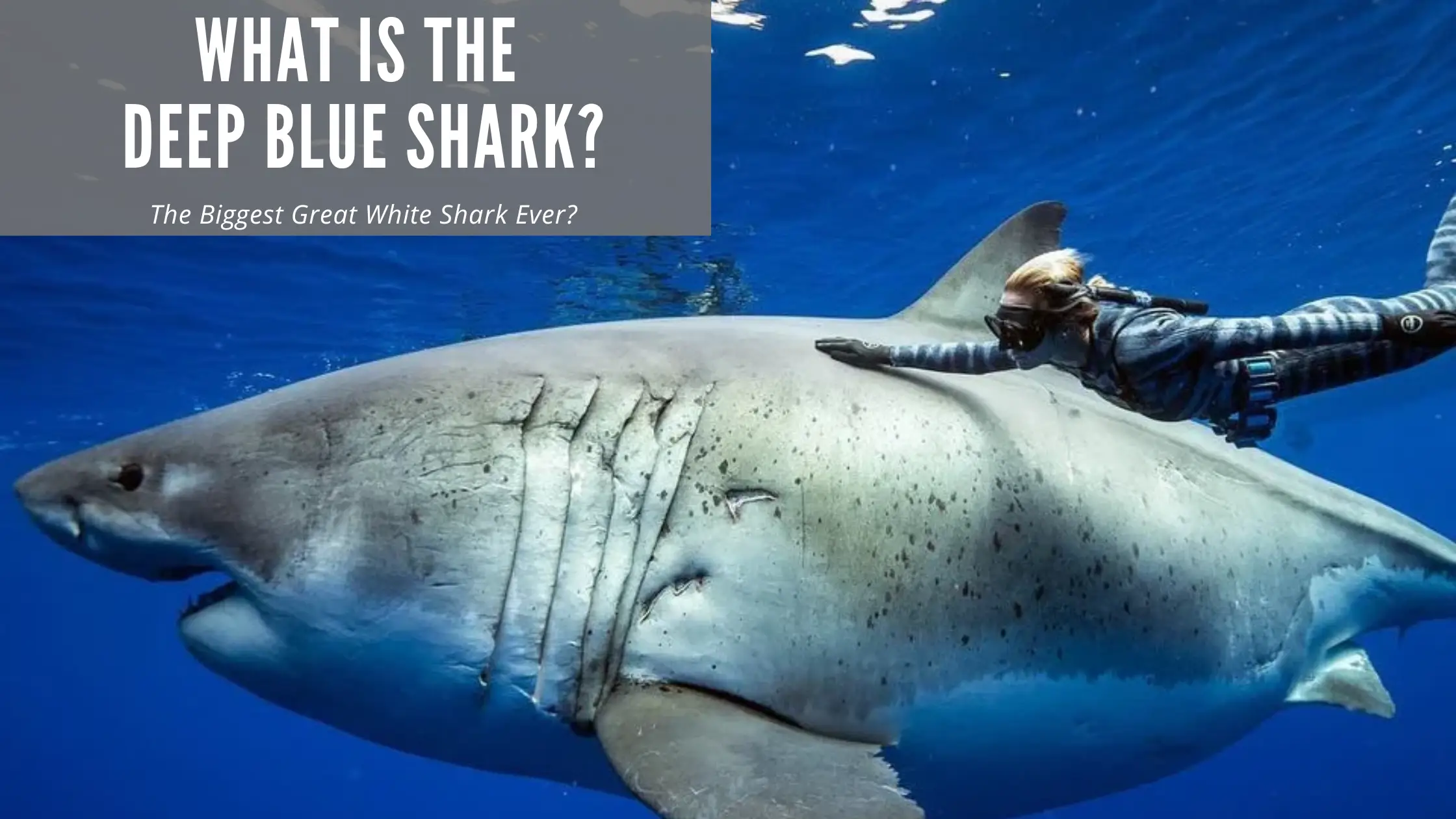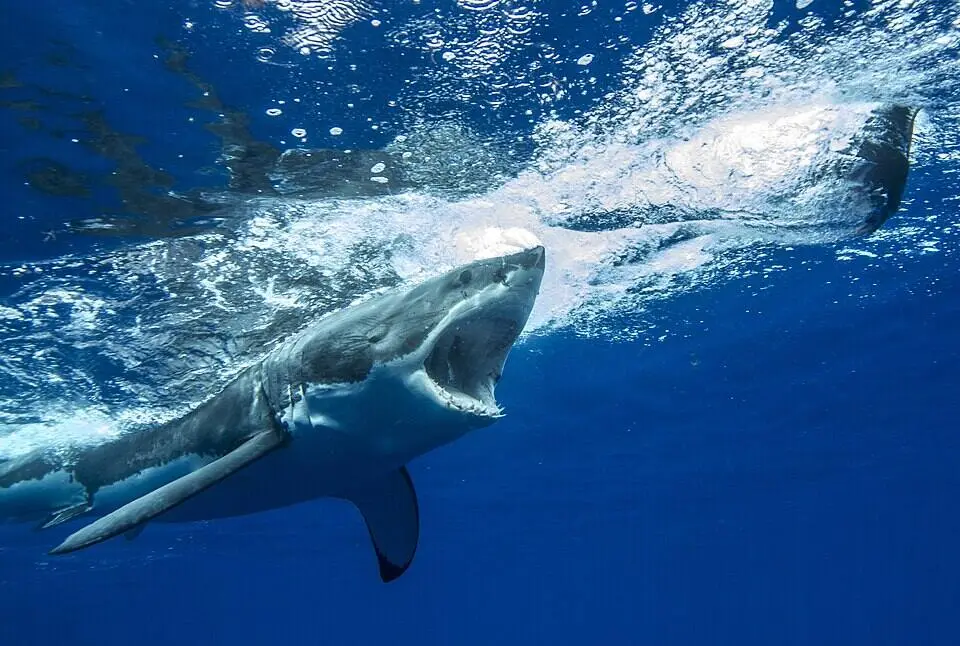Now Reading: Up Close With the Deep Blue Great White Shark: A Living Giant of the Sea
-
01
Up Close With the Deep Blue Great White Shark: A Living Giant of the Sea
Up Close With the Deep Blue Great White Shark: A Living Giant of the Sea

Deep Blue, the deep blue great white shark, is one of the largest ever recorded. Her size, calm behavior, and rare sightings have fascinated divers and scientists alike. More than just a predator, she symbolizes ocean balance and has become a powerful icon in marine conservation efforts worldwide.
I still remember the first time I saw the video. A diver, floating calmly in the water, turns—and there she is. A colossal shadow gliding past. Not in a rush. Not aggressive. Just moving through her world like a queen on patrol. That was the moment the world met Deep Blue, the great white shark who would become something of a legend.
She wasn’t a monster. Not even close. She was mesmerizing.
Not Just Another Shark
Let’s get this out of the way: sharks are not all the same. And the deep blue great white shark? She’s in a class of her own. Clocking in at over 20 feet long and likely tipping the scales at 5,000 pounds, Deep Blue isn’t just big—she’s monumental.
They say she’s around 50 years old, give or take. That means she’s been swimming through the Pacific since the early ’90s, or maybe even earlier. Born in deep water. Survived everything the ocean threw at her. Grew bigger and stronger with each passing year. That’s not luck. That’s pure resilience.
Where Did She Come From?

No one knows exactly where Deep Blue was born. But scientists think she likely came from somewhere in the vast Pacific breeding zones—maybe near Baja California. Her first known filmed appearance was off Guadalupe Island, Mexico, in 2013.
The footage? It’s surreal. She moves right past a diving cage, her skin covered in scars, her belly full. Calm. Almost indifferent to the humans nearby.
And that’s what makes her so different. It’s not just the size—it’s the energy. A stillness. A self-assurance you don’t expect from a predator.
The Name Says It All
She’s called Deep Blue not just because she lives in the ocean. Her actual skin tone is darker than most great whites—a deep, smoky slate blue that seems to shimmer when the light hits just right.
And then there’s the fin. If you’ve seen her in footage, you’ll recognize her by the markings. Little nicks and jagged edges. Kind of like a fingerprint. No two fins are quite the same.
Add in a few scars across her torso—likely from mating or battles with other predators—and you start to see her not as a monster, but a survivor.

What Does She Eat?
You’d think something that size would devour everything in sight. But she doesn’t. Like other great whites, Deep Blue mostly feeds on seals, sea lions, tuna, and sometimes dolphins or smaller sharks.
Her hunting style is quick and quiet. She’ll approach from below, strike hard once, and then back off. Let the prey tire out. It’s not chaotic. It’s strategic. That’s what years in the wild teach you.
A Shark That Changed Minds
The thing is, Deep Blue wasn’t just another animal caught on camera. She became a conversation starter. Suddenly, people who had feared sharks were watching her videos on loop. Not because they were afraid—but because they were fascinated.
She helped rewrite the narrative. Sharks weren’t just teeth and blood anymore. They were elegant. Important. Worth protecting.
Migration Patterns of the Deep Blue Great White Shark
Sharks like Deep Blue don’t stick to one spot. They move—a lot. Some scientists have tracked similar sharks moving between California and Hawaii, following seasonal prey and breeding cycles.
She might swim thousands of miles a year. Think about that. While we’re glued to our screens, she’s cutting through open ocean in complete silence.
We don’t always know where she is. That’s part of the mystery. She disappears, then shows up again years later like a myth made real.
Why She Matters
Sharks like Deep Blue are apex predators. That means they’re at the top of the food chain. And that matters more than you might think.
Without predators like her, seal populations would explode. Fish numbers would drop. Coral systems would get thrown off. It’s all connected.
Protecting sharks is about more than just saving one species—it’s about keeping the ocean in balance. And that balance directly affects things like seafood stocks, climate regulation, and coastal health.
Conservation Through Curiosity
Before Deep Blue, shark conservation was a niche thing. Divers cared. Scientists cared. The rest? Not so much.
But then she showed up. Calm. Gentle. Enormous. Real.
And suddenly, regular folks were paying attention. Sharing her videos. Asking questions. Learning. That matters.

Can You Help? Absolutely.
You don’t need a marine science degree to make a difference.
- Reduce plastic waste: It ends up in the ocean, hurting fish, seals, and eventually sharks.
- Support ocean protection groups: Even a small donation helps.
- Talk about sharks: Share real info. Not horror stories. The more people know, the more likely we are to care.
Some Questions You Might Still Have
Roughly 20 feet long. Some say she could be a bit more. That’s longer than most SUVs.
Nope. All known footage shows her behaving calmly around people. No attacks linked to her.
Estimates say 50 years or more. Older sharks are often larger and more mellow.
Guadalupe Island. That was the last confirmed sighting. But who knows where she is now?
Because her story makes a bigger point: Sharks matter. The ocean needs them. And so do we.
Final Thoughts
The ocean is full of noise—waves crashing, whales singing, boats humming. But Deep Blue? She’s the silence in between. The pause that makes you look twice. The reminder that there’s still wildness out there we haven’t ruined.
She isn’t just a shark. She’s a moment. A shift in how we see an entire species.
And she’s still out there. Somewhere. Moving through blue water, unnoticed. Exactly how she likes it.

Grayson Wells is a U.S. tech journalist specializing in gadgets and gaming. He reviews the latest gear, explores industry trends, and delivers clear, practical insights for everyday readers and enthusiasts.
Stay Informed With the Latest & Most Important News
Previous Post
Next Post
-
 01Happy Gilmore 2: Your Complete Guide to the Golf Comedy Sequel
01Happy Gilmore 2: Your Complete Guide to the Golf Comedy Sequel -
 02Joe Root’s Test Runs: England’s Batting Genius in Focus
02Joe Root’s Test Runs: England’s Batting Genius in Focus -
 03The Bad Guys 2 (2025): Everything We Know So Far
03The Bad Guys 2 (2025): Everything We Know So Far -
 04Demon Slayer: Kimetsu no Yaiba The Movie: Infinity Castle Tickets – Your Guide to the Epic Anime Event
04Demon Slayer: Kimetsu no Yaiba The Movie: Infinity Castle Tickets – Your Guide to the Epic Anime Event -
 05RTX 50 Series Unleashed: Next-Gen Gaming Power Awaits!
05RTX 50 Series Unleashed: Next-Gen Gaming Power Awaits! -
 06The Naked Gun 2025: What to Know About the Comeback Comedy Starring Liam Neeson
06The Naked Gun 2025: What to Know About the Comeback Comedy Starring Liam Neeson -
 07Freakier Friday 2025: Full Cast Breakdown, Plot Twists, Musical Throwbacks & Streaming Info
07Freakier Friday 2025: Full Cast Breakdown, Plot Twists, Musical Throwbacks & Streaming Info














